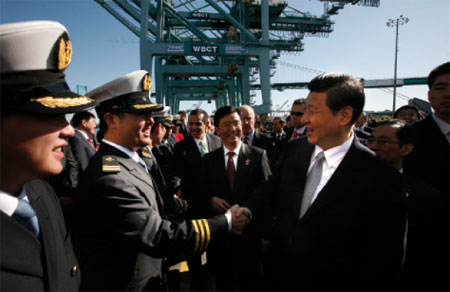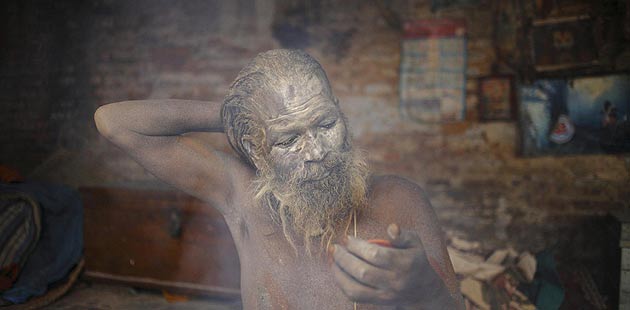Experts hail Xi's local connections
Updated: 2012-02-17 15:14
By Chen Weihua (China Daily)
|
|||||||||||
|
Vice-President Xi Jinping shakes hands with officers as he tours China Shipping at the Port Of Los Angeles in San Pedro on Thursday. Bob Chamberlin / via Agence France Press |
NEW YORK - By visiting a farm and a basketball arena, Vice-President Xi Jinping is getting to know America beyond top-level meetings in Washington, and that, experts say, will help China and the US weather the political storm.
Derek Scissors, a research fellow at the Asian Studies Center of the Heritage Foundation, said Wednesday that he is very happy that Xi stopped in Iowa and California.
Scissors said he believes that there are serious problems in the China-US relationship that will harm communication between Washington and Beijing. But by moving beyond the two capitals, much can still be accomplished.
"The fact that Xi Jinping was in Iowa 25 years ago and is back in Iowa now, I think that's good," Scissors said at a discussion titled "Xi's Visit: What's Next for US-China Relations", held Wednesday afternoon at the American Enterprise Institute.
"I think the American president should start going to different provinces in China. I think it would be absolutely a great thing, politically possible," he said.
Scissors pointed out that while the clashing interests between US and China mean that some talks are going to be very difficult, there are other things that can be done to reinforce the relationship.
He mentioned the governors meeting as a good example of positive exchanges between the two countries.
Following the US-China Governors Forum in Salt Lake in July, a second forum was held in Beijing in October. US officials from Georgia, Washington, North Carolina, Hawaii and Guam met with Chinese provincial governors about trade and investment cooperation.
"Let's open different fronts. Let's see that states like Iowa are happy with their interactions with the Chinese companies, Chinese political officials and provinces in China," Scissors said.
Orville Schell, Author Ross director of the Center on US-China Relations at the Asia Society in New York, also suggested in an interview with China Daily that the two governments could explore new avenues of interaction since most of the Sino-US conversations take place at the Chinese central government and US federal government level.
Schell said when arguments and conflict crops up, such as policy disagreements, the communication at this point isn't constructive.
"The place I think where China needs to turn, and so does the US, is more on the state-to-state or country-to-state relationship. There is a great need for Chinese investment, not political barriers and disputes," Schell said.
Schell said he believes that's also good for building a good image for Chinese investment, just like the Japanese companies did in the 1980s, such as building auto plants from state to state.
Dan Blumenthal, a resident fellow at the American Enterprise Institute and former vice-chairman of the US-China Economic and Security Review Commission, acknowledged that in an election year, politicians have to show their constituents in the United States that they are tough on currency manipulation, human rights and other political touchy topics.
Former Massachusetts Governor Mitt Romney, who is competing for the Republican presidential nomination, attacked China in an op-ed in Thursday's Wall Street Journal. He covered everything from military threats to currency manipulation.
Scissors of the Heritage Foundation said he believes that the US has put too emphasis on the Chinese currency exchange rate in the past.
He noted that bilateral trade deficits went up $132 billion in the seven years from 2004-11, despite the fact that the yuan exchange rate increased 25 percent from 8.28 to 6.21.
"People who attacked the exchange rate are either incompetent or they have been politically dissent," he said.
"And yet that has been supposed to be the No 1 US economic priority. If we can't figure out what really matters to us, we can't possibly be happy in negotiating with China," said Scissors, who has testified before Congress on China's exchange rate and other economic issues.
In Scissors' eyes, the exchange rate has to be removed from the discussion. He said that seemed impossible six months ago, but it's at least possible now.
"We are not going to get anywhere by playing the exchange game," he said.
Scissors said the focus has now moved to issues such as subsidies for Chinese enterprises.
China Daily
Hot Topics
Wu Ying, iPad, Jeremy Lin, Valentine's Day, Real Name, Whitney Houston, Syria,Iranian issue, Sanyan tourism, Giving birth in Hong Kong, Cadmium spill, housing policy
Editor's Picks

|

|

|

|

|

|







